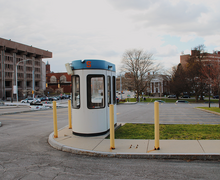Not all students benefit from military recruitment
I read with interest the article ‘SU military recruitment benefits from recession.’ SU students are fortunate to have the opportunity to consider this career option in a tough economy.
However, not all SU students are eligible to take advantage of these opportunities. Lesbian, gay and bisexual students are not eligible to serve openly in the U.S. military, and in fact, more than 8700 LGB service members have been discharged due to their sexual orientation since the ‘Don’t Ask, Don’t Tell’ policy was instituted in 1994. In many cases, these students lost their educational funding.
Under the Solomon Amendment, colleges and universities that receive federal funds must allow military recruiters the same access as other recruiters or risk losing their funding. Syracuse filed an amicus brief opposing this amendment back in 2005; however, it remains in force, and President Obama has recently suggested that he may wait perhaps years before beginning to push to end DADT.
SU is rightfully proud of its perfect five-star rating on the 2007 LGBT-Friendly Campus Climate Index. However, that does not mean that the university does not have an obligation to work to end the discriminatory, and damaging, DADT policy. In arguments on whether the Solomon Amendment violates universities’ right to free speech, the military’s lawyer noted that universities or student groups could voice their opposition to the policy: They could put signs on the bulletin board next to the door (of the recruiter), they could engage in speech, they could help organize student protests.
I fully support our men and women in uniform, and any SU student who chooses a military career. However, just as LGB students should not have to choose between living their lives openly and serving our country, Syracuse should not have to choose between providing students with a high-quality education and its values as an institution committed to ending discrimination based on sexual orientation.
Sarah Owocki
Graduate Student, Languages, Literature and Linguistics
Published on March 1, 2009 at 12:00 pm





